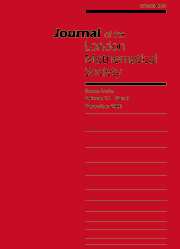Article contents
RATIONAL POINTS ON A CLASS OF SUPERELLIPTIC CURVES
Published online by Cambridge University Press: 01 April 1999
Abstract
A famous Diophantine equation is given by
formula here
For integers k[ges ]2 and m[ges ]2, this equation only has the solutions x = −j (j = 1, …, m), y = 0 by a remarkable result of Erdős and Selfridge [9] in 1975. This put an end to the old question of whether the product of consecutive positive integers could ever be a perfect power (except for the obviously trivial cases). In a letter to D. Bernoulli in 1724, Goldbach (see [7, p. 679]) showed that (1) has no solution with x[ges ]0 in the case k = 2 and m = 3. In 1857, Liouville [18] derived from Bertrand's postulate that for general k[ges ]2 and m[ges ]2, there is no solution with x[ges ]0 if one of the factors on the right-hand side of (1) is prime. By use of the Thue–Siegel theorem, Erdős and Siegel [10] proved in 1940 that (1) has only trivial solutions for all sufficiently large k[ges ]k0 and all m. This was closely related to Siegel's earlier result [30] from 1929 that the superelliptic equation
formula here
has at most finitely many integer solutions x, y under appropriate conditions on the polynomial f(x). The ineffectiveness of k0 was overcome by Baker's method [1] in 1969 (see also [2]).
In 1955, Erdős [8] managed to re-prove the result jointly obtained with Siegel by elementary methods. A refinement of Erdős' ideas finally led to the above-mentioned theorem as follows.
- Type
- Notes and Papers
- Information
- Copyright
- The London Mathematical Society 1999
- 11
- Cited by


